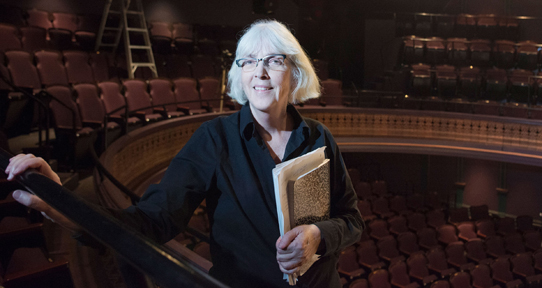From headline to centre stage

A renowned UVic playwright probes the issues and emotions behind real-life headlines
by John Threlfall
When it comes to researching a new play, internationally celebrated University of Victoria playwright Joan MacLeod often takes inspiration from the headlines.
From the murder of Victoria teenager Reena Virk to issues facing new immigrants and the importance of righting historical wrongs, MacLeod’s plays are universally acclaimed for their ability to present realistic characters grappling with key emotional situations.
When her latest play, The Valley, makes its BC premiere at the Belfry Theatre in February, audiences will find themselves catapulted into a head-on collision between two of the defining issues of our time—law enforcement and mental illness.
MacLeod says she was inspired by the case of Polish immigrant Robert Dziekański, who died as a result of RCMP tasering at the Vancouver airport in 2007. But rather than focus on that one situation, she decided instead to look at the pressures that may have caused the RCMP’s controversial response.
“I started thinking about an altercation between a police officer and a person in distress,” she says. “As I did more research, I became really interested in that intersection between the mentally ill and the police, who are often front-line workers with the mentally ill—and not necessarily by choice.”
While the psychotic breakdown of an 18-year-old university student on Vancouver’s SkyTrain may be the spark that ignites the play’s dramatic powder keg, the heart of The Valley is how two families— both the boy’s and the police officer’s—each battle depression.
“There’s an assumption that it’s going to be about police brutality, but at the end of the day, this is a play about the ‘everydayness’ of mental illness. I didn’t want it to be an ‘us and them’ thing; I want people to look at the world in a different way.”
Much like policing, MacLeod acknowledges how the perception of mental health has changed over her lifetime—something she’s witnessed first-hand as a university professor.
“This is about a first-year student who falls apart, and anyone who teaches post-secondary has had that experience. He’s not based on any specific student, but as a professor I’m aware of the pressure our students are under, their vulnerability.”
As a playwright, a big part of MacLeod’s research is ensuring the authenticity of her scenes. While writing The Valley, she consulted a police officer and a psychiatric nurse, as well as Andrew Solomon’s definitive 700-page study, The Noonday Demon: An Atlas of Depression.
“Based on the people who have seen the show, the mental health issues are portrayed pretty accurately,” she says. I’m proud of the fact that everyone in this play gets a fair shake—the police officer, his wife, the boy, his mother.”
Is there a trick to achieving that level of authenticity on stage? “That’s just what playwrights do,” she says. ”That’s our job—to get inside a character and make the audience feel that way.”
More than books or television, MacLeod feels the stage is the best place to bring these kinds of emotional issues to light. “Theatre is ideal for that. When it’s done right, you’re having a true emotional experience. And it makes for a very powerful combination when you base it on a real event.”
View as PDF (323K).
The Valley runs Feb. 2–28 at Victoria’s Belfry Theatre. The Belfry will also be hosting a special UVic Alumni event on Feb. 7, where MacLeod—an alumna of UVic’s writing department—will speak after the show.
MacLeod’s plays include Jewel, Toronto, Mississippi, Amigo’s Blue Guitar, The Hope Slide, Little Sister, The Shape of a Girl, Homechild and Another Home Invasion. Her work has been translated into eight languages.
MacLeod is currently writing her 11th play, Gracie. “It’s based in part on the polygamous community in Bountiful,” she says. “I never know what I’m going to write. It’s almost like I have to trick myself into getting really interested in something.”
MacLeod has won every major Canadian playwriting prize, including the Governor General’s Award and the $100,000 Siminovitch Prize. “Joan is a master of expressing the profoundest human emotions, putting to paper the vulnerability, the compassion, the weaknesses and strengths of the human spirit,” said the Siminovitch jury chair.
When it comes to teaching playwriting, MacLeod says the trick is to find truth and common ground. “It comes down to a sense of veracity, of remaining true to your characters,” she says. “All I can teach students about is language and what good dialogue is. It’s up to them to make it feel true.”
